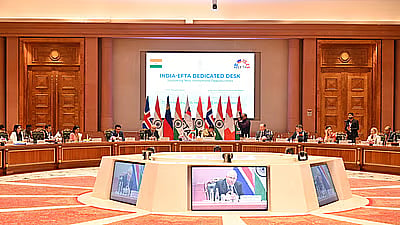
European Free Trade Association (EFTA) desk.
Credit: Credit: X/@PiyushGoyal
New Delhi: The free trade deal between four European nations (EFTA) and India will bring in transformative changes in boosting two-way economic ties and could not have come at a better time, Switzerland State Secretary for Economic Affairs Helene Budliger said as the ambitious pact came into effect on Wednesday amid trade disruptions caused by the US tariff tussle.
The Trade and Economic Partnership Agreement (TEPA) inked between New Delhi and the European Free Trade Association, comprising Switzerland, Norway, Iceland and Liechtenstein, is expected to cut tariffs on 92.2 per cent of Indian product categories.
Under the provisions of the pact that was sealed in March last year, the four countries pledged to invest a whopping USD 100 billion in India in the next 15 years, besides enhancing trade engagement in areas of technology, manufacturing, textiles, leather and food products.
"It will be like a booster. There is a kind of massive interest coming from Switzerland for investing in India. I think it is safe to say that it is even more meaningful for us (in view of the current state of global trade)," Budliger told PTI in an interview.
The trade pact came into effect amid a severe downturn in India's ties with the US after President Donald Trump slapped a 50 per cent tariff, including a 25 per cent additional duty for its purchase of Russian crude oil.
In her remarks, Budliger, however, said the India-EFTA trade pact is not at all related to the current situation arising out of Washington's trade policy as the deal is the result of 16 years of negotiations.
"This is really an excellent moment and it will give additional emphasis to what we are trying to do. But it is wrong to say that it was a response to what has been going on in the world," she said.
India is the fifth-largest trading partner for the EFTA and the two-trade has been on an upswing between the two sides in the last few years.
"It could not have come at a better moment. But at the same time, I do not want us to be perceived as an opportunistic country. Because the world now is in turmoil, all of a sudden we discovered our love and admiration for India -- it is not the case at all."
"That's why I underlined that we wanted this for 16 years. We negotiated it for 16 years. We have had a long-standing relationship. We felt incredibly proud to be India's friend and partner," she said.
Bullish about India's economic growth, Budliger recalled Commerce Minister Piyush Goyal's "30-30-30" formulation to describe the country's future development trajectory.
"Minister Goyal, during negotiations, often talked to me about 30-30-30. That means in 30 years, India will be a USD 30-plus trillion economy and your population will still be 30 years of age. And we completely bought into that," she said.
The Swiss State Secretary for Economic Affairs also pitched for having a bilateral investment protection treaty with India.
"That is one of the things that our companies are looking for," she said.
Budliger also exuded confidence that the EFTA nations would meet the target of USD 100 billion investment in India within 15 years.
"It is a realistic figure. It is the private sector that needs to come into play. Our private sector is very serious about it. I can tell you there is massive interest to boost ties with India," she said.
"The representatives of 40 companies are with me. They have massive investment plans. I am very optimistic that within 15 years, we will reach the USD 100 billion investment target," the top Swiss official said.
At the same time, she said the framework conditions will need to be in place.
Budliger said the trade pact will also boost India-Switzerland bilateral trade cooperation.
Over 330 Swiss companies are present in India in sectors such as engineering, services, precision instruments, chemicals and pharmaceuticals, while Indian companies are present in Switzerland in sectors such as IT, pharmaceuticals and machinery.
In June, Commerce Minister Goyal visited Switzerland, with a focus on advancing bilateral economic cooperation and operationalising the TEPA.
Goyal held talks with Federal Councillor Guy Parmelin and State Secretary Budliger to chart a forward-looking roadmap for TEPA implementation.
The discussions also focused on regulatory cooperation, skills development, innovation partnerships, and mechanisms to facilitate faster investment decision-making.